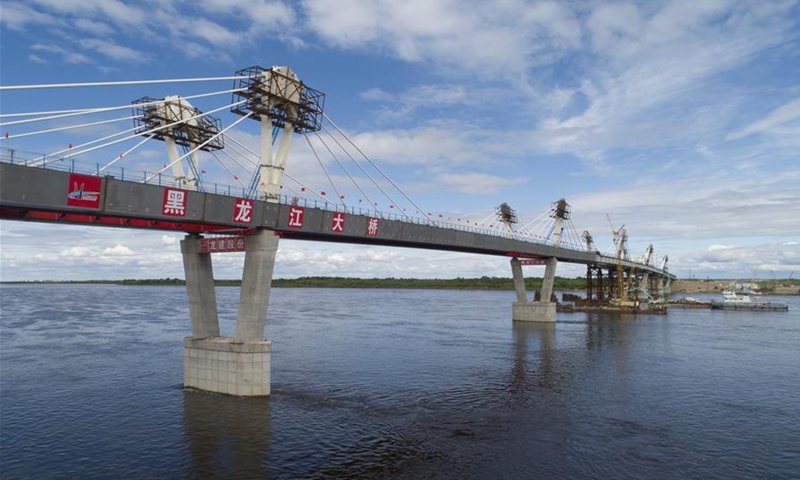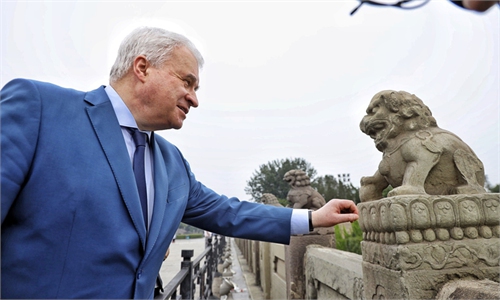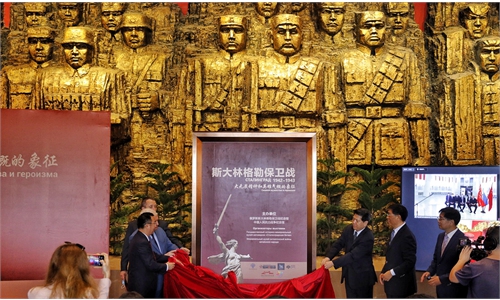Chinese investments could unlock potential of Russia’s Far East, boost trade
Policy, infrastructure in place for regional cooperation

The Blagoveshchensk-Heihe highway bridge in Heihe, Northeast China's Heilongjiang Province Photo:Xinhua
Chinese experts and business executives expressed confidence in the broad scope and deep potential for economic cooperation between China and Russia in the Far East, as Russia's 6th Eastern Economic Forum (EEF) began Thursday in Vladivostok.
Chinese President Xi Jinping addressed the opening ceremony of the EEF on Friday at the invitation of Russian President Vladimir Putin.
"We need to redouble our efforts to advance mutually-beneficial cooperation. We need to deepen the collaboration between the Belt and Road Initiative and the Eurasian Economic Union, support the innovative development of the digital economy, jointly tackle global climate change, and promote social and economic development in the region," Xi said via video link.
As a raft of policies have been issued by the Chinese and Russian governments fostering economic cooperation in the region and a large number of key cross-border infrastructure projects are completed or near completion, analysts said China-Russia trade could be further boosted.
China designated Northeast China's Heilongjiang Province as a free trade zone (FTZ) in 2019 with an eye to boost trade and economic ties with Russia. Analysts also pointed out the Far East has a vital role to play in boosting bilateral trade.
The FTZ in Heilongjiang has handled trade worth 12.89 billion yuan ($2 billion) in the first seven months of this year, surging 44.9 percent from the same period in 2020, state broadcaster CCTV reported on August 27. Trade reached 20.49 billion yuan in 2020, up 12.8 percent year-on-year.
Several infrastructure projects have also seen major progress and analysts noted that such projects are important in the alignment between the Eurasian Economic Union and the Silk Road Economic Belt Initiative, as well as a new phase of common development of Russia's Far East region and northeast China.
At Heihe, the Blagoveshchensk-Heihe highway bridge, the first highway bridge connecting China and Russia, saw its related port facility passing examinations on Friday, the local government announced. The port will operate as a year-round international road traffic port for passengers and freight.
The world's first cross-border cable car at Heihe linking Blagoveshchensk, has also achieved "substantial progress," a project manager with Chinese infrastructure giant China Railway Construction Corporation told the Global Times on Friday.
The cable will reduce border crossing time to less than 10 minutes from a 30 minute-long boat ride across the Heilongjiang River, known as the Amur River in Russia. "Since construction work began in April, 152 cement pillars have been completed as of August, which means half of the cement structure work has been completed," the manager said at the project site.
In Tongjiang, the Sino-Russian Tongjiang-Nizhneleninskoye railway bridge is largely completed after seven years and is awaiting a test train run.
The bridge has an annual designed cargo capacity of 21 million tons and is expected to greatly boost trade in iron ore between the two countries.
A project manager at the site told the Global Times on Friday that the train test was delayed due to the recent flood and postponed to the end of the month.
On the Russian side, construction of the Binhai 1 and Binhai 2 international transport corridors by China and Russia is also in progress.
Li Xin, director of the Center for Russian and Central Asia Studies at the Shanghai Institutes for International Studies, told the Global Times on Friday that although the infrastructure and policy support are ready and in place, many Chinese business people believe that passion on bilateral trade and economic cooperation that will benefit the Russian Far East among the two sides is uneven. "The Chinese side seems to be more enthusiastic than their Russian counterparts," Li noted.
"Should the Russian side be more willing, and enhance project and enterprise matching, it will be very easy to reach the set goal of boosting bilateral trade to above $200 billion by 2024," Li said.
Analysts pointed out that the current bottleneck in Chinese investments in the region is protectionism and Russia's less-than-desirable business environment.
For instance, a new Russian policy has hindered the trade of lumber.
Chinese Ambassador to Russia Zhang Hanhui said at the forum that China is ready to encourage any enterprises that may invest in the Far East, as well as expand bilateral cooperation with Russia in various fields, Russian news agency TASS reported on Thursday.
Russian President Vladimir Putin declared that Russia is setting up a tax-free zone to stimulate business on the Kuril Islands.
Yuri Tavrovsky, head of the Expert Council of the Russian-Chinese Committee for Friendship, Peace and Development, told the Global Times on Friday that Russia could use Chinese experience and technologies to create the 21st century level infrastructure in Siberia and Russian Far East.
"We acknowledge Chinese experience in developing islands in the South China Sea and would like to use it in improving living and business conditions on the Kuril Islands. These islands are critically important for safe navigation in the Western Pacific and the Northern Sea route," Tavrovsky said.
In 2018, the EEF secured $42.3 billion in investment deals, and $46.4 billion in 2019.
With "best in history" bilateral ties, China-Russia trade has been gaining momentum this year, despite the negative impact of the COVID-19 pandemic that has put cross-border business exchanges on hold. In the first seven months of this year, China's trade in goods with Russia topped $75.49 billion, data from the Chinese customs authority showed.
"Based on the current growth rate, bilateral trade for the whole year of 2021 in goods is very likely to reach $150 billion, thereby setting a new record," predicted Li Xin, director of the Center for Russian and Central Asia Studies at the Shanghai Institutes for International Studies.
A Chinese business executive with a farming company attended the EEF. He told the Global Times on Friday that he noticed that due to the pandemic, there are fewer international attendees and the topics are more focused on local issues. "It can be felt that the pandemic has negatively impacted the economy of the Far East."
"Yet, I felt the determination of the Russian federal government to develop the Far East region," said the executive, who has been stranded in Russia due to the curbs placed on cross-border travel.





